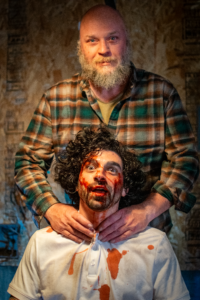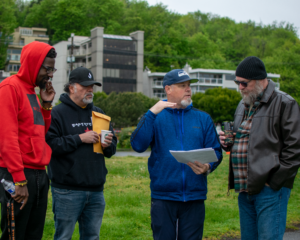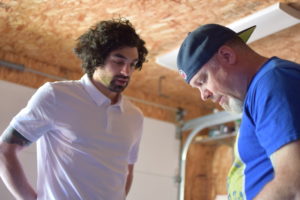The Good (congratulations)
When writing reflections, it is crucial to lead off with praise and positivity as well as making it the emphasis of the reflective activity. Since overall the project went well, and is thus far successful, I spent the most time considering what went right to focus on that as I work toward a repeatable process.
Cast
I feel as if the best thing that happened to this production was that we had an amazingly talented cast who really absorbed the characters and brought them to life in unexpected ways. I know this was a bit of luck that happened bringing the cast together, but knowing people and having referrals via networking is one of the reasons why I wanted to do this whole four films in a year goal.

Both Scott and Gio were amazing, and their performance together took the story to a higher level than I originally conceived when I wrote it. Michelle is awesome and she immediately knew what I was speaking about when I gave her the character reference for Capt. Anderson. Her help on Saturday morning helped drive Scott’s performance as he had the opportunity to do the actual back and forth with the conversation instead of having to pace it in his head. Grace had a minor VO part, but the fact that she recorded her “voicemail” beforehand so we had access to hear it during production was key.
Having cast who were on point and hitting deadlines, for me, is at the top of my “congratulations on a job well done” list here because I feel that helped elevate the characters and the story in a way that made direction way easier. When everyone is on the same page, or close, it makes the immersion that much greater.
Pre-Production
Because we kept the top crew small, which I list below, the length of the pre-production helped immensely with the creative process. More than that, the amount of pre-pro hours we put in allowed me to better prepare for actual production. The two table reads helped me revise the script as I matched it with the storyboard in the creation of the first animatic. I began a second animatic to reflect the second table read, but I honestly ran out of time and didn’t finish the scene 3 section of it.
The good news is that I knew scene 3 was going to be difficult to shoot. Being prepared going into it helped when things began to get intense and stressful during production on Sunday.
Something else I need to mention here was that I feel my producer / 1AD understood my vision from us speaking about the story in length so was able to help me out on set when I began to struggle. Having someone onboard who is helping produce a short film production and has spent time with you in pre-production is incredibly helpful.
Concise Script
I know the whole “no exposition” thing became a bit of a joke during pre-production and script revisions, but realistically a less is more approach benefitted everything. Because there was only dialogue in two scenes, the back and forth and double coverage was reduced in production. That helped technically because we didn’t need to run every scene two times for dialogue coverage. More than that, I didn’t want to tell the entire story. I wanted to make the audience struggle with the difficult decision just as Daniel did. Is he off the hook? etc.
Plenty of Support
I know I didn’t want a large crew, but having good crew relieves a lot of pressure. In this, Mark was key. Not only did he help with the table reads, but he connected us with Scott—who was perfect as Daniel. Mark’s calm demeanor and general comfortability with the whole process is a good balance to less experienced people on the crew.
Teh support of our families is a big part of the success of the production for me. Not only did my producer and I spend a lot of time away from them doing pre-production, but we co-opted his garage for a day to film a murder. I can only imagine what the neighbors thought when they heard all the screams and crying. 
Clearly Marked Production Date
Goal setting helps with motivation more than many people imagine. Artists in general tend to get lost when not given clear deadlines. I know it helped me. I forced myself to adhere to the “no zero days” rule of doing, at the very minimum, one thing that added to the project.
The Bad (challenges)
Although I’ve listed these as “bad,” I don’t feel either were essentially bad because I understand the issues and can visualize a way to solve them while moving forward. Those listed in this category are what I consider learning opportunities that will help me grow as I move forward. I only listed the two most significant that I thought of because there will always be smaller issues to overcome throughout the process of creation. I accept those and use them to further myself. Those listed here affected me in a way that could have had larger repercussions on the project which might have led to wasted time interfered with others’ ability to be their best selves in the moment.
Wearing too many Hats
For whatever reason, Blue didn’t have a true Director of Photography. Although we had one tentatively lined up, he was unable to commit due to schedule conflicts. I initially wanted to shoot the film to keep the crew small, but the producer and I decided during pre-production that bringing in a DP would ease the amount of work I was doing since I was already writer, director, editor, etc. 
I was nervous about bringing in a DP so late in the process. Although I enjoy filming and am used to doing so on smaller projects, I feel as if the scope of the production of Blue became larger than I initially imagined. When it was pointed it out to me, it made perfect sense and I plan on approaching the successive projects differently. What ended up happening was that I felt pretty good on Saturday while the scenes were lighter and easier to film, but I began to get confused and lose track of my shots and shot list on Sunday when there was more coverage was necessary for the dialogue. I also wrote the shot list differently from how I normally do, so that didn’t help when I was feeling the pressure and didn’t have my usual document to fall back upon.
Shot List / Shooting Script
I believe in shot lists and use them as much as I possibly can. Unfortunately, I didn’t do a good job with writing the shot list for this because I wrote it a different way and didn’t flesh it out later. This forced me to have to reference both the shot list and the script during the pressure of Sunday’s shoot. What I really needed was a single document that gave me all the information I needed.
